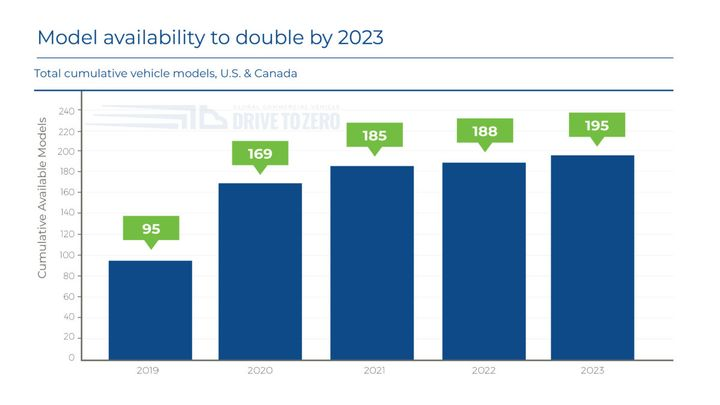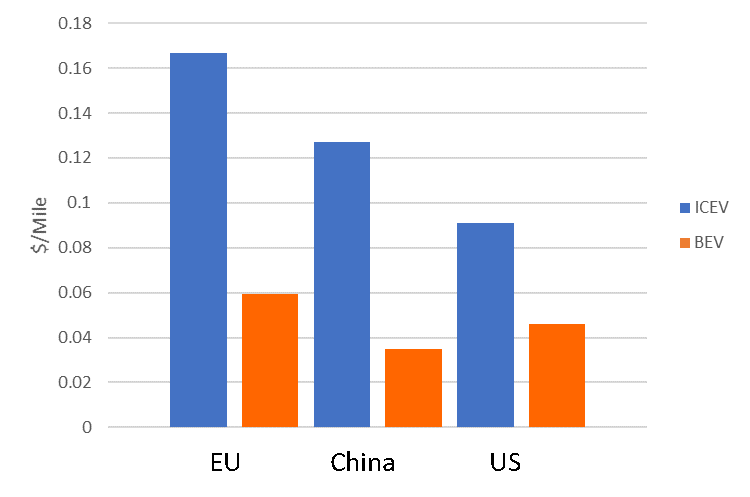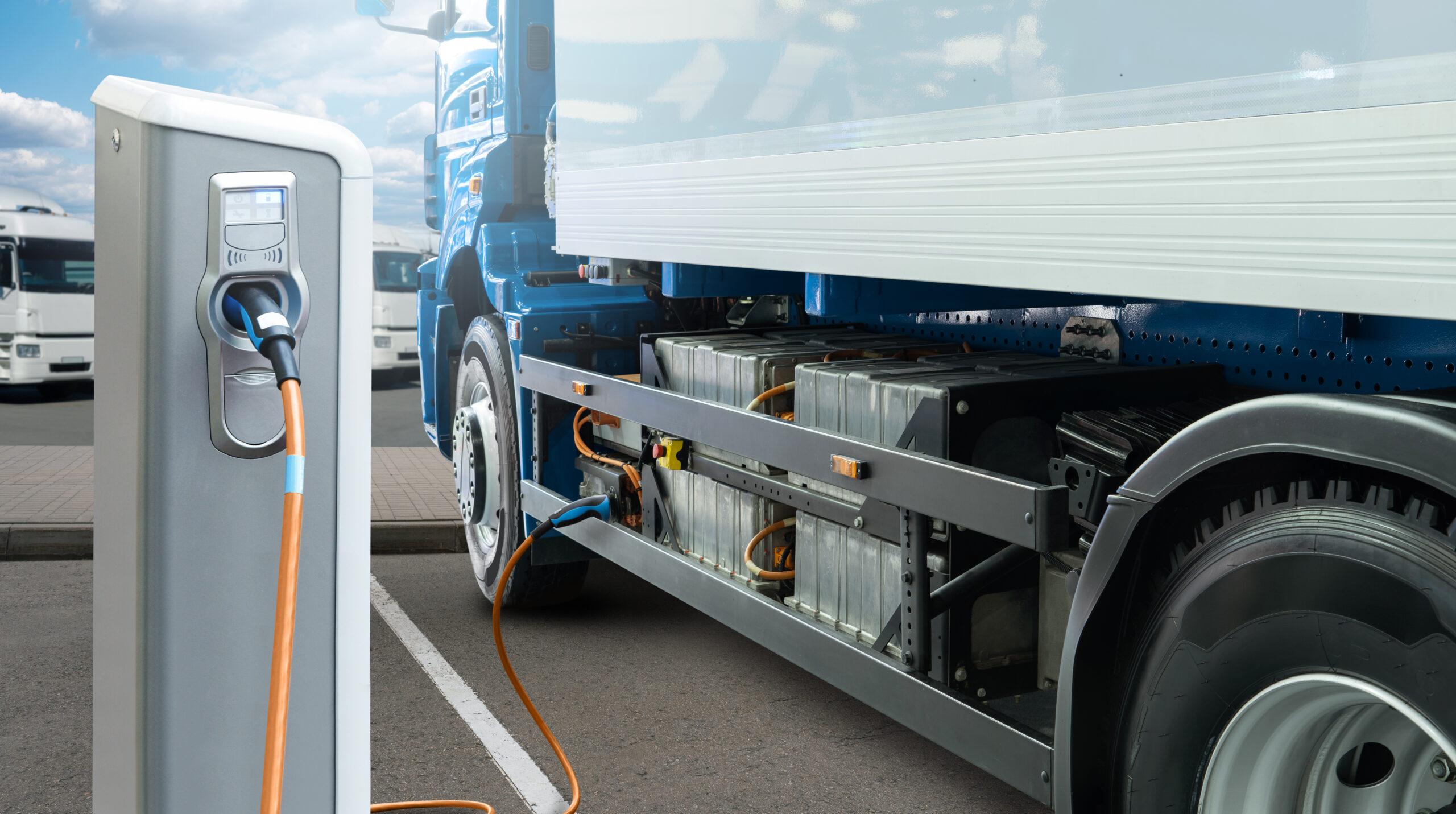“Inevitable” — this is how 90% of fleet managers describe the future use of electric vehicles in the commercial fleet business in a recent survey.
Ben Mandel, a director of clean-transportation non-profit Calstart explains says, “Zero-emission trucks and buses are on the verge of a major surge in the U.S. and Canada. The growth we’re seeing is happening really across the board.” The organization estimates that the number of electric truck models will hit 195 by 2023, which is double the number of available models in 2019.

Based on the number of would-be available electric commercial vehicle models, it seems like OEMs are preparing for higher adoption of electric vehicles among fleets (Image Source).
Cleaner Emissions: The Biggest External Factor Driving EV Adoption Among Fleets
The factors driving the adoption of electric vehicles among fleets fall under two major categories — external factors and internal motivations.
The biggest external factor pushing fleets to switch to electric trucks is reducing carbon emissions. This could stem from a company’s own initiative to go green or to comply with government regulations.
One of the best examples is the California Air Resources Board’s Advanced Clean Truck Regulation. The said regulation is motivated by the state’s mandates to “reduce air pollutants to protect public health and to meet state climate change targets.” Once the final version of the regulation is approved, it would require fleets with 100 trucks or more to report about their current operations to ensure that eventually, they will switch to zero-emission electric vehicles.

It’s All About the Money: The Biggest Internal Motivations for Fleet Electrification
As for the internal motivations that could stimulate the adoption of electric trucks among fleets in the coming years, fleet managers need to be able to present a strong business case based on the following:
- Fuel cost reduction
- Maintenance cost reduction
- Overall operational cost reduction
While there are fleet companies that are showing a growing consciousness about their impact on the environment, the adoption of electric vehicles in this sector would speed up knowing how the switch would affect their bottom line. As explained by Gio Sordoni, COO and co-founder of Thor Trucks, “We don’t expect anyone to buy electric trucks because they’re worried about the environment or because they want to be nice. The beauty of these trucks is that fleets will be making the decision to deploy them based on bottom-line dollars and cents. There is a strong economic argument for the use of battery-electric trucks today.”
The initial numbers are promising. According to digital transformation advisory firm ARC, electric vehicles record lower per-mile energy costs versus traditional trucks that run on petrol in 3 of the key markets with the highest electrification among fleets: Europe, China, and the United States.
Savings in energy consumption is going to be one of the biggest drivers of electrification among fleets (Image Source).
In addition to the money saved from reduced energy consumption, fleets can also cut down on maintenance expenses. Fleets with electric vehicles don’t need to worry about spending on the following, just to name a few:
- Oil filters and oil changes
- Engine sludge
- Fuel injector cleaning and fuel filters
- Ignition coils and spark plugs
- Air intake filters, catalytic converter, timing belt, and muffler
Everything considered, it seems like fleets are moving toward an electric-powered future. Now the question is, how is this going to affect fleet management?
Similar, Yet Different
All the fundamentals of managing a fleet of trucks that run on petrol will still be applicable in managing a fleet of electric vehicles. Fleet managers still need to monitor driver behavior and potential maintenance issues for preventive measures. Safety, efficiency, and delivery and dispatch management still need to be prioritized.
The main difference will be seen in two key areas.
First, the metrics that fleet managers need to monitor. For instance, charging sessions, battery life, and electricity rates (off-peak versus peak hours) are some of the new stats that fleet managers should keep an eye out for. It’s pertinent for fleet managers to source telematics and fleet management solutions providers who can keep track of this data.
Second, fleet managers would need to identify the next steps and optimization opportunities for their newly acquired electric trucks. For instance, there’s a lot of talk about how electric vehicles will pave the way for fully autonomous vehicles (think self-driving trucks), which would hopefully maximize productivity and driver safety.
Full Speed Ahead to an Electrified Future
Due to pressures from the government to cut the transport industry’s carbon emissions and the promise of cost savings, it appears that switching to electric vehicles is the inevitable next step in the evolution of the trucking sector. Fleet managers should take into consideration both external factors and internal motivations. Changes in fleet management strategies also need to be considered as well as creating a transition plan to electric vehicles.
If you want to keep ahead of the technology curve and prepare for a tech-savvy future, reach out to us by filling out the form on your right-hand side!
Here is another article that you might like to read: Why Add Electric Vehicles to Your Fleet








